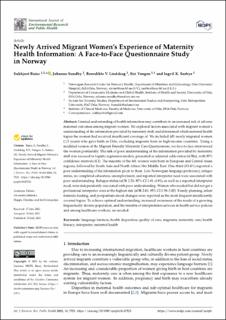| dc.contributor.author | Bains, Sukhjeet | |
| dc.contributor.author | Sundby, Johanne Sommerchild | |
| dc.contributor.author | Lindskog, Benedikte V | |
| dc.contributor.author | Vangen, Siri | |
| dc.contributor.author | Sørbye, Ingvil K. | |
| dc.date.accessioned | 2021-11-01T13:51:55Z | |
| dc.date.available | 2021-11-01T13:51:55Z | |
| dc.date.created | 2021-08-18T10:28:23Z | |
| dc.date.issued | 2021-07-15 | |
| dc.identifier.issn | 1661-7827 | |
| dc.identifier.uri | https://hdl.handle.net/11250/2826956 | |
| dc.description.abstract | Limited understanding of health information may contribute to an increased risk of adverse maternal outcomes among migrant women. We explored factors associated with migrant women’s understanding of the information provided by maternity staff, and determined which maternal health topics the women had received insufficient coverage of. We included 401 newly migrated women (≤5 years) who gave birth in Oslo, excluding migrants born in high-income countries. Using a modified version of the Migrant Friendly Maternity Care Questionnaire, we face-to-face interviewed the women postnatally. The risk of poor understanding of the information provided by maternity staff was assessed in logistic regression models, presented as adjusted odds ratios (aORs), with 95% confidence intervals (CI). The majority of the 401 women were born in European and Central Asian regions, followed by South Asia and North Africa/the Middle East. One-third (33.4%) reported a poor understanding of the information given to them. Low Norwegian language proficiency, refugee status, no completed education, unemployment, and reported interpreter need were associated with poor understanding. Refugee status (aOR 2.23, 95% CI 1.01–4.91), as well as a reported interpreter need, were independently associated with poor understanding. Women who needed but did not get a professional interpreter were at the highest risk (aOR 2.83, 95% CI 1.59–5.02). Family planning, infant formula feeding, and postpartum mood changes were reported as the most frequent insufficiently covered topics. To achieve optimal understanding, increased awareness of the needs of a growing, linguistically diverse population, and the benefits of interpretation services in health service policies and among healthcare workers, are needed. | en_US |
| dc.description.sponsorship | This research was funded by the Research Council of Norway, grant number 273328. | en_US |
| dc.language.iso | eng | en_US |
| dc.publisher | MDPI | en_US |
| dc.relation.ispartofseries | International Journal of Environmental Research and Public Health (IJERPH);Volume 18 / Issue 14 | |
| dc.rights | Navngivelse 4.0 Internasjonal | * |
| dc.rights.uri | http://creativecommons.org/licenses/by/4.0/deed.no | * |
| dc.subject | Language barriers | en_US |
| dc.subject | Health disparities | en_US |
| dc.subject | Care quality | en_US |
| dc.subject | Migrants | en_US |
| dc.subject | Maternity care | en_US |
| dc.subject | Health literacy | en_US |
| dc.subject | Interpreters | en_US |
| dc.title | Newly Arrived Migrant Women’s Experience of Maternity Health Information: A Face-to-Face Questionnaire Study in Norway | en_US |
| dc.type | Peer reviewed | en_US |
| dc.type | Journal article | en_US |
| dc.description.version | publishedVersion | en_US |
| dc.rights.holder | © 2021 by the authors | en_US |
| dc.source.articlenumber | 7523 | en_US |
| cristin.ispublished | true | |
| cristin.fulltext | original | |
| cristin.qualitycode | 1 | |
| dc.identifier.doi | https://doi.org/10.3390/ijerph18147523 | |
| dc.identifier.cristin | 1926873 | |
| dc.source.journal | International Journal of Environmental Research and Public Health (IJERPH) | en_US |
| dc.source.volume | 18 | en_US |
| dc.source.issue | 14 | en_US |
| dc.source.pagenumber | 1-12 | en_US |
| dc.relation.project | Norges forskningsråd: 273328 | en_US |

